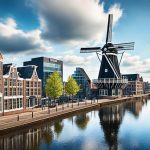Welcome to our series exploring the stable and robust economy of The Netherlands. Over the years, the country has established itself as a powerhouse in the European marketplace, known for its enduring growth and flourishing economy.
The Netherlands boasts a stable economy that has weathered global economic challenges, thanks to its prudent fiscal policies and a well-regulated financial system. These foundations of stability have ensured that the country remains resilient in the face of economic uncertainties.
One key aspect that sets the Dutch economy apart is its diversification across various industries. From advanced manufacturing to technology, agriculture to logistics, The Netherlands has strategically developed key sectors that contribute to its economic prosperity. Moreover, the country’s emphasis on international trade has further bolstered its resilience.
Innovation and technological advancement are also at the heart of the Dutch economy. With a strong focus on research and development, the Netherlands fosters a culture of innovation. The thriving startup ecosystem and entrepreneurial spirit drive new ideas forward, ensuring that the country remains at the forefront of technological advancements.
Lastly, The Netherlands has established strong international economic relations, including its membership in the European Union. This allows the country to benefit from favorable trade agreements and global partnerships, attracting foreign investment and further contributing to the stability and prosperity of its economy on a global scale.
In the following sections, we will delve deeper into each of these aspects, showcasing the pillars that have made the Dutch economy a force to be reckoned with. Join us on this journey as we uncover the secrets to the Netherlands’ robust and stable economy, and explore how it continues to thrive amidst a rapidly changing world.
The Foundation of Stability
In this section, we will explore the factors that have laid the foundation of The Netherlands’ stable economy. The country’s economic stability can be attributed to its prudent fiscal policies and well-regulated financial system.
The Dutch government’s fiscal policies play a crucial role in maintaining economic stability. By implementing sound financial strategies and ensuring a balanced budget, the government has created an environment that fosters long-term growth and prosperity.
Another key factor contributing to the stability of the Dutch economy is its prudent financial system. The country has developed a robust framework of regulations and oversight that promotes transparency, accountability, and risk management in the financial sector.
This prudent financial system not only safeguards against economic crises but also attracts foreign investors, thereby strengthening the overall economic stability.
By prioritizing economic stability through fiscal policies and a prudent financial system, The Netherlands has created a favorable environment for businesses to thrive and for individuals to prosper.
Further sections will explore the diversified and resilient nature of the Dutch economy, the role of innovation and technological advancement, and the country’s international economic relations.
Diversified and Resilient Economy
In today’s interconnected global economy, diversification and resilience are crucial for sustainable growth and prosperity. The Dutch economy exemplifies these qualities, making it a standout performer in Europe.
One of the key factors contributing to the stability and resilience of the Dutch economy is its diversification across various industries. The country boasts a diverse range of key industries that drive economic growth and create employment opportunities.
- The Netherlands is renowned for its agrifood sector, which includes dairy products, fruits, vegetables, and flowers. With its innovative approach to farming and food processing, the country has established itself as a major player in the global agrifood market.
- The manufacturing industry also plays a vital role in the Dutch economy, with a focus on high-tech and advanced manufacturing sectors. Companies like Philips, ASML, and Heineken have gained international recognition for their quality products.
- The energy sector, particularly renewable energy, has seen significant growth in recent years. The Netherlands is a leader in offshore wind energy and has ambitious targets to increase its renewable energy production.
- The financial services industry, centered around Amsterdam’s bustling financial hub, contributes to the country’s economic resilience. Dutch banks and insurance companies are renowned for their stability and solid risk management practices.
- The creative industry, including design, fashion, and architecture, demonstrates the Dutch penchant for innovation and creativity. Dutch designers and brands are known for their cutting-edge concepts and sustainable approaches.
Another key aspect that contributes to the diversification and resilience of the Dutch economy is its emphasis on international trade. The Netherlands leverages its strategic location and well-developed infrastructure to facilitate global trade. The Port of Rotterdam is one of the busiest ports in the world, connecting Dutch businesses to global markets.
Moreover, the Netherlands has a long history of engaging in international trade, with strong ties to countries around the world. The country actively participates in trade blocs, such as the European Union, and has an extensive network of trade agreements that provide a solid foundation for international commerce.
This focus on diversification, key industries, and international trade has enabled the Dutch economy to weather various economic challenges over the years. The resilience demonstrated by the Netherlands during times of uncertainty highlights the strength and adaptability of its economy.
Overall, the diversified and resilient nature of the Dutch economy, driven by its key industries and emphasis on international trade, positions the country as a global economic powerhouse.
Innovation and Technological Advancement
Innovation and technological advancement are integral to the stability and growth of the Dutch economy. The Netherlands has established itself as a global leader in innovation, fostering an environment conducive to research and development (R&D) and the growth of startups.
With a strong focus on R&D, the country encourages a culture of exploration and experimentation. This emphasis on innovation has led to breakthroughs in various fields, including technology, healthcare, and sustainable solutions. Dutch companies actively invest in cutting-edge research and collaborate with academic institutions to drive technological advancements.
The thriving startup ecosystem in the Netherlands further contributes to its innovative landscape. Startups are known for their agility and disruption, injecting fresh ideas into the market. The country provides extensive support for startups, offering funding opportunities, mentorship programs, and access to a network of experienced entrepreneurs.
The entrepreneurial spirit in the Netherlands is fostered through a combination of factors, including a supportive legal and regulatory framework, access to capital, and a culture that embraces risk-taking. Startups in the country benefit from a vibrant community, where networking events, co-working spaces, and incubators abound.
The Power of Collaboration
Innovation in the Dutch economy thrives on collaboration between businesses, government institutions, and academia. Public-private partnerships promote knowledge-sharing, resource pooling, and joint initiatives, which accelerate technological advancements and boost economic growth.
Furthermore, the Netherlands is a frontrunner in adopting emerging technologies. From artificial intelligence and robotics to renewable energy and sustainable transportation, the country actively explores and integrates these technologies into its industries. This commitment to embracing and leveraging technology enhances productivity, efficiency, and competitiveness on a global scale.
The Dutch government also plays a crucial role in driving innovation and technological advancement. It supports initiatives that stimulate research, development, and the commercialization of new technologies. Investment in innovation is a strategic priority to ensure the Netherlands remains at the forefront of technological progress.
In conclusion, the Netherlands is a hotbed of innovation and technological advancement. The country’s focus on research and development, thriving startup ecosystem, and collaborative approach to innovation have positioned it as a leader in a wide range of industries. Through these efforts, the Dutch economy continues to evolve, adapt, and thrive in the ever-changing global landscape.
International Economic Relations
The Netherlands has cultivated strong international economic relations, positioning itself as a key player in global trade. As a member of the European Union, the country benefits from a vast network of trade agreements, allowing for seamless commerce within the region. These agreements not only guarantee access to a market of over 500 million consumers but also foster an environment of stability and predictability for businesses.
Furthermore, The Netherlands actively engages in global partnerships, leveraging its strategic location and extensive logistics infrastructure. With world-class ports and efficient transport networks, the country serves as a hub for international trade. These partnerships enable Dutch businesses to establish strong connections with global markets, facilitating the exchange of goods, services, and knowledge.
Add to that the country’s attractiveness for foreign investment. The Netherlands boasts a highly favorable investment climate, offering various incentives and a robust legal framework to protect investors’ interests. International companies find the Dutch business environment conducive to growth due to factors such as a highly skilled workforce, technological innovation, and a culture of entrepreneurship.
All these elements collectively contribute to the stability and prosperity of the Dutch economy on a global scale. By actively participating in trade agreements, being a member of the European Union, forging global partnerships, and welcoming foreign investment, The Netherlands solidifies its position as a thriving economy with immense potential for continued growth and development.













